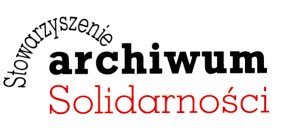Stowarzyszenie "Archiwum Solidarności"
Nasza historia i misja
W 1983 roku, gdy trwała jeszcze „noc generała”, grono dziennikarzy i historyków postawiło sobie za cel ocalenie i utrwalenie choć części dorobku ludzi, którzy ruchy te tworzyli, ryzykując — jak to okazało wprowadzenie 13 grudnia 1981 roku stanu wojennego — życie, zdrowie i mienie. Utworzyliśmy wówczas (w ramach „konspiry”, ale bez formalnego związku z żadną z istniejących podziemnych struktur) „Archiwum Solidarności”. Praca nasza polegała na gromadzeniu, opracowywaniu i udostępnianiu — w nielegal¬nym „drugim obiegu” — dokumentów, relacji i analiz dotyczących niezależnych ruchów społecznych. Udało nam się zebrać znaczną ilość podstawowych dokumentów „Solidarności” (m.in. zapisy magnetofonowe I Krajowego Zjazdu Delegatów, posiedzeń Komisji Krajowej), a także zachęcić dziennikarzy i historyków do opisania poszczególnych wydarzeń i opracowania relacji. Od 1984 roku seria Archiwum Solidarności zaczęła pojawiać się w — jak to wówczas mówiono — „punktach kolportażu”. Naszym stałym partnerem była Niezależna Oficyna Wydawnicza NOWA, najbardziej zasłużone i największe wydawnictwo konspiracyjne. Do 1990 roku wydaliśmy 24 książki.
Upadek komunizmu w Polsce pozwolił nam zmienić formę działania, ale nasze dotychczasowe wysiłki nie poszły na marne. Odwrotnie — rola opisywanych przez nas ruchów w jego obaleniu nadała im dodatkowe znaczenie. W 1991 roku powstało Stowarzyszenie Archiwum Solidarności, które przejęło dorobek i zbiory poprzedniej, nielegalnej „firmy”. W ciągu pięciu lat od powstania Stowarzyszenia opublikowaliśmy siedem książek, w tym 2-tomowe wydanie poświęcone procesowi o uprowadzenie księdza Jerzego Popiełuszki (proces toruński).
Dzięki uprzejmości Ośrodka KARTA posiadamy stałą siedzibę przy ulicy Narbutta w Warszawie. Jednocześnie wszystkie zbiory archiwalne zostały zdeponowane jako oddzielna kolekcja w Archiwum PRL-u. Stowarzyszenie porządkuje i w miarę możliwości poszerza własny zasób archiwalny oraz kontynuuje działalność wydawniczą, dokumentującą dorobek niezależnych ruchów społecznych i opozycyjnych z lat 1976-1989, w szczególności NSZZ „Solidarność”.
Stowarzyszenie "Archiwum Solidarności" przyjmuje, gromadzi i następnie udostępnia archiwalia wytworzone przez NSZZ "Solidarność" (1980-1989) i inne niezależne ruchy społeczne (w szczególności interesują nas wspomnienia, dzienniki, dokumenty własne struktur związkowych i opozycyjnych, a także nagrania dźwiękowe i filmowe). W ostatnich latach swoje zbiory przekazali nam m.in.: śp. Maciej Geller, Wiktor Kulerski, Barbara Liberska, Piotr Szczepański.
Wszystkie osoby i organizacje chętne do współpracy z nami serdecznie do niej zapraszamy.
The Society of Solidarity Archives
Our history and mission
As the „general’s night” 1983 was going on, a group of journalists and historians decided they should save and preserve the memory of at least some of the accomplishments of the people who authored and spearheaded the Polish August of 1980 – indeed to save their life, health and property, as the implementation of the Martial Law December 13, 1981 showed. It was under these conditions the „Archives of Solidarność” was set up (in the circumstances of conspiracy yet without any formal connection with the existing underground structures). Our work involved collecting, elaborating and disseminating documents, accounts and analyses related to independent social movements (through the illegal „secondary circulation”).
We managed to gather a substantial numer of Solidarity’s fundamental documents (i.e. tape recordings of the First National Meeting (Congress) of the Delegates in Gdańsk 1981, meetings of the National Committee i.e. Komisja Krajowa), as well as encouraging journalists and historians to document and describe major events. Since 1984 the „Archiwum Solidarności” (the title of the Archive used in that period) series began to appear in the underground press distribution points. Our permament partner was the Independent Publishing House NOWA, the major and the most well-known publisher of the underground. In the period up to 1990 it published 24 our books.
The fall of communism in Poland has made it possible for us to change the way we operate, yet this does by no means discredit our previous efforts. On the contrary – the role of the movement in the overthrow of communism which we described gives them an added significance. In 1991 the „Society of Archives of Solidarność” (Stowarzyszenie „Archiwum Solidarności”) was created which took over the accomplishments and collecions of the former illegal „firm”. Our grounding fathers were Janina Jankowska and Ireneusz Białecki, Grzegorz Boguta, Jerzy Holzer, Sergiusz Kowalski, Marcin Kula, Piotr Marciniak, Andrzej Paczkowski, Edmund Wnuk-Lipiński.
At present, thanks to the kindness of the KARTA Centre with which we have established a close collaboration, we have managed to obtain permanent residence at L. Narbutta Street 29 in Warsaw. Simultaneously, all the most important records and archives collected have been placed as a part of the „Solidarność – narodziny ruchu” archival collection.
Now that a permanent place has been found, it will be possible to put the records of the Society in order and to expand the collection. We also aim to continue our publishing activities, focusing on documenting the achievements of the independent social and resistance movements of the years 1976–1989, in particular NSZZ Solidarność.
All the individuals and organisations interested in our activities are cordially invited to collaboration.
